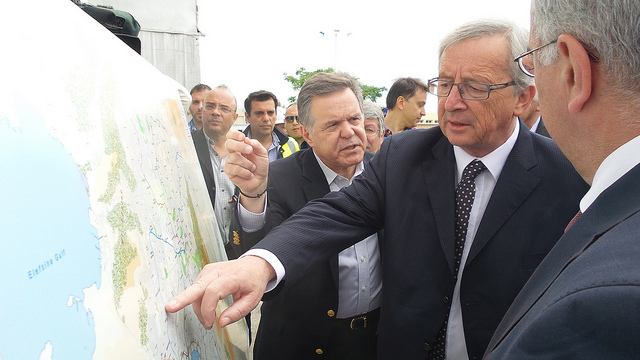If the European Union wishes to increase its standing with the public, improved performance and greater accountability will be required
In recent years, the European Union appears to have been in perennial fire-fighting mode. During this time, there has been a noted decline in the public’s trust for EU institutions. Here, Alina Mungiu-Pippidi argues that while more accountability is important, the main thing that the EU can do to regain lost trust is to perform better, and suggests some practical reforms that could be undertaken to bring this about.
In recent years, the European Union has fought both a crisis of confidence as well as a crisis of economy. The two crises have left European citizens asking whether the EU remains the best instrument to enhance continent-wide prosperity. People also have justifiably asked whether in order to preserve the Euro, the EU may need to further sacrifice democracy. Since 2011, European citizens have been losing faith with the European project. Citizens are split, with around half feeling that their voice counts in the EU, and half feeling the opposite. While trust is generally higher in newer member states – such as Romania (62%), Ireland (57%), Lithuania (55%), Bulgaria (55%), Poland (53%) – clear majorities of respondents in Mediterranean countries (Cyprus, Greece, Spain and Portugal), have a negative image of the EU, which since 2007 have shown significantly lower levels of trust in both European and national political institutions.
Could increasing the amount of democracy in the EU be the best way to redress this crisis of confidence? To answer, I ran some statistical explanatory models of trust, and tried to understand where the trust went between the last two rounds of the European elections – and why.
Surprising results?
Firstly, I found no evidence that the loss of confidence in the European Union is triggered by the rise of new populist actors with an anti-immigration, anti-globalisation and anti-Europeanisation stance. They may be enemies of democracy who wish to subvert the foundations of EU legitimacy, but they have profited from the confidence crisis, rather than caused it. My research suggests that it is a myth that public opinion in Europe has shifted significantly towards populism. Furthermore, those populist movements who have been successful have predominantly national, rather than pan-European explanations.
Secondly,as we might expect, the economy matters; but results are more mixed than we may have expected. It is growth, rather than unemployment, that drives confidence more robstly. This is probably because its manifestations are more visible to citizens. Countries which experienced lower levels of growth during this interval of time saw confidence in both EU and national institutions decline.
Thirdly, we find different mechanisms of trust intermediation in old and new Europe, but a strong link with the assessment of how national government handles corruption in both. The declining confidence in Europe is in part due to a loss of trust in European elites – though the decline is more marked at the national level. In recent years, tax evasion and corruption scandals in many European countries have marred governments’ reputation and led to an unprecedented rise in the number of people who believe that elites govern solely in their own interest. In most EU countries, citizens have come to believe that business culture is now based on government preferment, rather than on free competition. I found this to be strongly associated with confidence in EU in established EU member states, as people used to trust EU by extension of the confidence previously invested in their national elites. In Eastern Europe (countries such as Romania, Bulgaria and Slovakia) the situation is reversed, and people tend to trust Brussels, as it is seen as a check on corrupt politicians at home.
Returning power to the people
In short, Europe is facing two problems. One is the declining belief that a union with a common currency can deal with the crisis better than individual countries could do themselves. The second is the shrivelling credibility of political elites. Low electoral turnout and the rise of populists are best explained by national, not pan-European factors.
So, why seek more unified ‘institutional’ solutions to what are, in fact, local problems spawned by one-size-fits-all approaches? Ideas floated over time such as the creation of a directly elected presidency of the European Union would not have the desired impact chiefly because they attempted to treat misdiagnosed symptoms of a democratic deficit as the source of discontent among Europeans. We would want Europeans to have more voice, but only if they agree with the elites. Well, giving them more ‘democracy’ when, in fact, more than ever before question the European project, will do nothing but further subvert the integration project.
What should be done?
Firstly, no solution for a rejuvenated Europe can work without economic success. If the EU doesn’t deliver prosperity over a longer period of time there is literally nothing that EU elites can do to save the project. People want performance – if this is reached by technocratic rather than democratic means, it will be accepted (recent figures from May 2015 EB already show that). There is also some potential in previously floated solutions to curb populism in European elections such as a change to electoral rules for the European Parliament to limit anti-system mandates.
Secondly, instead of making every day a grand existential plebiscite on Europe, who don’t we give the European people a voice on smaller and more concrete issues? Often it is issues of this kind which influence attitudes to Europe. The perception that EU elites and the EU itself each fail the accountability test can be successfully addressed. The EU should not pay the bill directly for national elites’ self-serving behaviour.
Lots of proposals are floated around to restore EU trust. In view of my findings, I think the highest potential lies with these ones:
- Firstly, reorganise EU cohesion funds to add a major social accountability component. That could include increased consultation at the local level in setting spending priorities. It needn’t mean further empowering local politicians (known as ‘barons’ in more than one country) but rather involving EU citizens directly more in this process through NGOs and business or community representatives. This would lead to a healthier level public consultation on the planning and a final assessment of EU projects by communities rather than professionals. No second Varoufakis should be allowed to ring true when saying that EU funds fuelled local clientelism rather than prevented it.
- Secondly, bolster the EU’s role in promoting civil rights and fundamental freedoms across borders. That could be done by enhancing the EU’s powers to tackle serious breaches of the Union’s common values such as freedom, free competition or the rule of law. Strengthening the EU’s Ombudsman office by removing him from the control of member states and placing him closer to communities could be one way of doing this. It would also be good to have a fully fledged body, designed along the lines of the European Court of Human Rights (which operates on the basis of Human Rights Convention) defending individuals against abuses of their European freedoms as specified in the treaties. Somebody should be mandated to protect EU citizens against, say, Nigel Farage and his attempt tor restrict the rights of other people.
- Finally, the enactment of a “right to challenge” to better accommodate EU’s capacity for innovation. That could be done by allowing organisations such as schools, local governments, individual cities and even member states to apply for exemption from existing EU rules or regulation when their projects can be shown to spur innovation.
All in all, it’s about keeping a closer check on the EU project’s development, without arresting it.
—
This is a summary of findings and ideas in the authors paper Fixing Europe Is About Performance, Not Democracy, published here by Global Policy. It represents the views of the author and not those of Democratic Audit UK. Please read our comments policy before posting.
—
Alina Mungiu-Pippidi is Professor of Democracy Studies at the Hertie School of Governance in Berlin.







 Democratic Audit's core funding is provided by the Joseph Rowntree Charitable Trust. Additional funding is provided by the London School of Economics.
Democratic Audit's core funding is provided by the Joseph Rowntree Charitable Trust. Additional funding is provided by the London School of Economics.
We believe public trust in the EU will rebound with the economy sooner rather than later. https://t.co/pQKgM8L7to
If the EU wishes to increase its standing with the public, improved performance and greater accountability are needed https://t.co/ftkusMMS0I
If the European Union wishes to increase its standing with the public, improved performance… https://t.co/r0M4UrhFlt
A very interesting article with ideas that might work for a time with (reorganise EU cohesion funds and promoting civil rights etc.) However, I do think the EU continues to kick the can of democratic accountability down the road. I can understand the need to do this while it sorts itself out. (Rome was not built in a day.) This project needs to establish itself first and clearly needs more time.
But one day, democratic accountability will just come back again and the time for kicking the issue down the road will run out. The plebiscite will want this too, and will not be bought off by the well-meaning issues of EU cohesion funds etc, indefinitely. It will do for a time, but only for a limited one.
There will come a period when the EU will need to implement a protocol or mechanism to give EU citizens an overall say in leadership. There will be clever politicians across Europe who will voice this and they will win votes. It’s more marked at national level now, as the article writer Alina Mungiu-Pippidi, rightly points out. However, tomorrow will come with new and old resurrected ideas, concerning democratic accountability, shall return.
Democracy for the plebiscite will not be cheaply bought and it will be realised that these complaints need to go beyond the national level sooner or later.
The emergences of a European political champion for democratic accountability will come along one day – one that will capture the imagination of Europeans at a Europe wide level. This is a mathematical probability that I think Alina Mungiu – Pippidi does not take into account.
Things always change. New and variable arguments will come into the EU equation in the future. I think the EU will develop and do well, but there are a lot of trials and tribulations to come.
If the European Union wishes to increase its standing with the public, improved performance and greater accountabi… https://t.co/0G2TQMaVZG
If the European Union wishes to increase its standing with the public, improved performance… https://t.co/Vu4bGi7fC4
If the European Union wishes to increase its standing with the public, improved performance and greater accoun… https://t.co/NiUYBlLWOf
To increase its standing with the public, the #EU needs improved performance and greater accountability https://t.co/cHwwZqvAML
If the European Union wishes to increase its standing with the public, improved performance… https://t.co/A88seTKBEc https://t.co/OtUN515ZJc